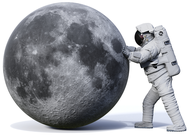Around the world, in different languages, different things have different names – which just makes sense.
(Except for “taxi.” Apparently, “taxi” means about the same thing in just about every language.)
For us, one of the most interesting lists we’ve compiled (and you know how much we love lists) is all of the names for our Moon there are around our world. I mean, we have countless cultures on our planet, but we collectively only have one Moon – or Mặt trăng, or Kuu, or Φεγγάρι, depending on where you’re from!
Here is a list of names for the Moon in various languages and cultures around the world that we have put together (so far):
- English: Moon
- Spanish: Luna
- French: Lune
- German: Mond
- Italian: Luna
- Portuguese: Lua
- Dutch: Maan
- Swedish: Måne
- Norwegian: Måne
- Danish: Måne
- Finnish: Kuu
- Russian: Луна (Luna)
- Polish: Księżyc
- Czech: Měsíc
- Slovak: Mesiac
- Hungarian: Hold
- Romanian: Lună
- Greek: Φεγγάρι (Feggari)
- Turkish: Ay
- Arabic: القمر (Alqamar)
- Hebrew: ירח (Yare’ach)
- Persian: ماه (Mah)
- Hindi: चंद्रमा (Chandrama)
- Bengali: চাঁদ (Chand)
- Japanese: 月 (Tsuki)
- Chinese: 月亮 (Yuèliàng)
- Korean: 달 (Dal)
- Vietnamese: Mặt trăng
- Thai: จันทร์ (Chan)
- Indonesian: Bulan
- Kashmiri: Zoon
- Swahili: Mwezi
- Klingon: maS
- Latvian: Mēness
By the way, the list is in no particular order. We jotted down the first few that we knew, and our readers provided the rest. The next one we get will be added to the bottom of the list.
In addition to these, there are many cultural and historical names for the Moon, its deities, gods and goddesses, including:
- Selene (Greek mythology)
- Diana (Roman mythology)
- Artemis (Greek mythology)
- Sin (Mesopotamian mythology)
- Chandra (Hindu mythology)
- Ix Chel (Mayan mythology)
- Heng-o (Chinese mythology)
- Mani (Norse mythology)
- Mėnuo (Lithuanian mythology)
Are there any others? Let us know!







